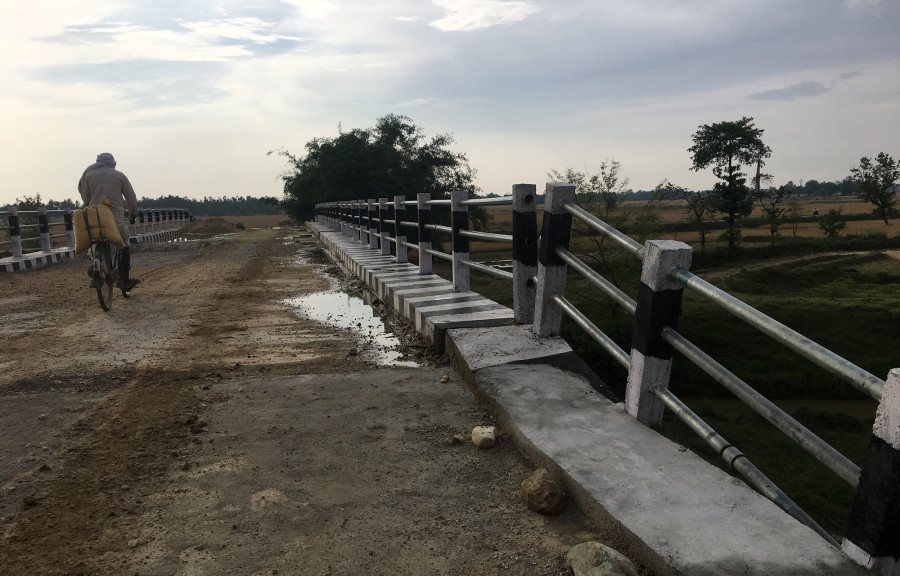Valley
Procurement monitoring office blacklist 47 firms in 11 months of current fiscal year
Such moves will bar under-performing contractors from participating in additional government contracts, officials say
Prithvi Man Shrestha
Pappu Construction, a controversial construction company, was supposed to get the contract to construct a new building for the Nepal Rastra Bank in Baluwatar. But it was denied the contract through administrative measures, including blacklisting threat, despite quoting the lowest price.
Firstly, the National Reconstruction Authority (NRA), which had taken the responsibility of reconstructing a new building after the earthquakes in April 2015, did not take any immediate decision on awarding the contract even after opening the financial bid on September 23 last year. Among 12 bidders in the race, the SRBC Pappu JV with a quoted price of Rs2.06 billion was selected after technical evaluation.
As Pappu was in the news for all the wrong reasons, the central bank first wrote to the NRA over a possibility of awarding the contract to SRBC Pappu JV.
“NRA Chief Executive Sushil Gyawali and the authority’s secretary also instructed the project office not to award the contract to SRBC Pappu JV,” said an NRA source. “When the NRA sought opinion from the Prime Minister’s Office, the latter was more keen on exploring ways to avoid awarding the contract to SRBC-Pappu JV rather than giving its opinion.”
In the meantime, efforts were made to blacklist Pappu Construction for its below par performance in other projects.
On November 12 last year, the Sikta Irrigation Project requested the Public Procurement Monitoring Office (PPMO) to blacklist the contractor for under-performance in headwork rehabilitation of the project’s Duduwa Irrigation System Four days later, the PPMO imposed a ban on Pappu from participating in any government bid even before blacklisting it, citing a possible loss to the government from its involvement in the bid.
The government agencies continued to mount pressure on Pappu to abandon the project, saying that it would be blacklisted which would lead to its automatic suspension from bidding for government contracts, the NRA source said requesting anonymity as he is not allowed to speak to the media.
As a result, SRBC Pappu JV did not make any request to the NRA to extend the bidding period beyond 120 days and the project was subsequently awarded to Samanantar Nirman Sewa—the second lowest bidder in the race, according to the source.
If any bidder does not request for an extension of the bid validity period, it is eliminated from the bidding process.
On March 23 this year, the PPMO blacklisted the Coastal-Pappu JV, barring it from government contracts for three years after the court vacated its stay order.
In a recent interview with the Post, Pappu owner Hari Narayan Rauniyar, who is a suspended lawmaker, claimed that his company was blacklisted to deny him the contract of the central bank building under pressure from Samanantar which quoted Rs2.10 billion. Pappu is among 47 firms blacklisted by the PPMO in 11 months of the current fiscal year—the highest in recent years.
Beside Coastal Pappu JV, foreign contractors like Central China Power Grid International Economic and Trade Co and China Shanix Construction Engineering (Group) Corporation have also been blacklisted.
Central China Power Grid International Economic and Trade Co was blacklisted on May 17 for three years at the request of the Nepal Electricity Authority.
The state-owned power utility had terminated its contract with the Chinese contractor in June 2017 for poor performance on the Bharatpur-Bardaghat portion of the 220 kV transmission line and three 220 kV substations in Hetauda, Dhalkebar and Inaruwa.
Also on May 17, another Chinese contractor was blacklisted for three years following a complaint from the Civil Aviation Authority of Nepal after it failed to start works on lengthening the runway at Tribhuvan International Airport under Air Transport Capacity Enhancement Project funded by the Asian Development Bank.
CAAN had terminated its contract with the company in June last year.
“The provision of blacklisting is important to ensure under-performing contractors are barred from participating in government contracts,” said Yagyaraj Koirala, spokesperson for the PPMO.
Koirala, however, said that the PPMO has not received many requests of blacklisting of the contractors for failing to perform on the projects they were hired for.
After the government launched action against not-performing or underperforming contractors last year, it was expected that more such contractors could be blacklisted within the current fiscal year.
However, Koirala said no such trend has appeared so far. “But, most of the contractors who have been blacklisted are those who failed to sign the contract after being selected,” he said. Officials said that the contractors do not sign the contract when they feel the price they have quoted is too low to work. “Due to a legal provision of awarding the contract to the lowest bidder, there is a trend of quoting a low price just to get the contract,” said Koirala.
Keshav Kumar Sharma, director general at the Department of Roads, also admitted that the trend of not coming to sign a contract prevails although it is not so frequent in the case of roads. “In such cases, we confiscate their security bonds and blacklist them as per the Public Procurement Act,” he said.




 22.59°C Kathmandu
22.59°C Kathmandu














